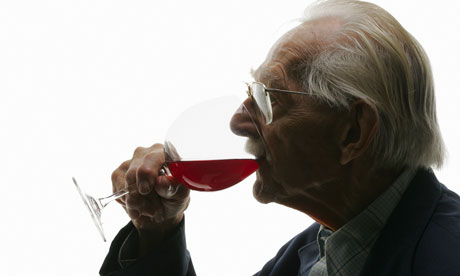
If you'd planned to spend your twilight years knocking back sherry, you should read the latest report from the Royal College of Psychiatrists. Our Invisible Addicts says that people over 65 should ration their tipples. One and a half units a day is the recommended amount – less than half the amount for younger people. And you need to stop any illicit drug habits that you've kept on from earlier years. You may even need to look at the medicines you're taking because chances are, by the time you're over 65, you might not be taking them properly. About a third of those over 65 take four or more prescribed drugs a day.
Is drug abuse really a problem in older people?
Over-45s are treated as older people when it comes to abusing drugs, and in the north-west of England the proportion of over-45s seeking help for drug taking increased from 6.4% in 2003/4 to 10% in 2006/7.
What about alcohol?
About 21% of older men (over 65) drink more than four units of alcohol at least one day a week, as do 10% of women. This is on the increase in both sexes. Bereavement, loneliness, chronic or painful illness, difficulty in sleeping and depression can all lead to drinking more. Older men are more at risk than women. The report says 14% of men and 3% of women over 65 binge drink, although they tend to do so at home.
Does alcohol affect you differently as you get older?
Older people are more likely to be taking prescription drugs that interact with alcohol. They also have a reduction in their body water-to-fat ratio, which means less water to dilute the alcohol in. Blood flow to the liver is reduced, too, and on arrival there, the liver enzymes are less able to cope with alcohol. Alcohol has a stronger and faster depressant effect on the brain, causing memory loss and problems with coordination. It can therefore cause confusion and falls (more rapidly than in younger people). Elderly drivers are three times more likely to be involved in a car accident if they have been drinking. The Royal College of Physicians says 60% of people who repeatedly go into hospital with confusion or falls at home could have alcohol problems.
What can I do about it?
Well, you can be honest with yourself about how much you are drinking, or if you are still taking any illegal drugs. The report was written to encourage doctors to ask about these problems – they usually don't because they think older people just knit and drink tea.
Up to one third of older people with alcohol problems develop them later in life – often in response to loss and stress. A high intake of alcohol in older people can contribute to dementia (a different sort to other dementias), other mental health problems such as depression and anxiety, and liver disease. Not to mention falling over and hurting yourself. If you are concerned about your drinking, see your GP.
How much is safe to drink?
The report's guidelines says a safe limit is 1.5 units per day or 11 a week. A unit is half a pint of beer or 50ml of sherry. A small glass of wine (12% alcohol by volume) is one and a half units.

